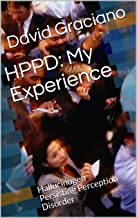Hallucinogen Persisting Perception
Hallucinogen persisting perception disorder (HPPD) is a chronic disorder in which a person has non-psychotic flashbacks of visual hallucinations or distortions experienced during a previous hallucinogenic drug experience, usually lacking the same feelings of mental intoxication experienced before.
Cluster Number:
Wiki Number: W092
Diagnosis: Hallucinogen-Persisting Perception Disorder
US Patients:
World Patients:
Sex Ratio:
Age Onset:
Brain Area:
Symptoms: non-psychotic flashbacks of visual hallucinations from previous drug expereinces; often visual snow as distracting lights
Progression:
Causes: prior use of hallucenogenic drugs, mescaline, MDMA (ecstasy)
Medications: cannabis worsens the effects; sedatives, sobriety from all psychoactive substances appears best
Therapies: talk therapy may help. 1 in 500,000 users may have chronic occurrences.
Youtube Video: Hallucinogen Persisting Perception Disorder
Amazon or Library Book: HPPD- My Experience with
Hallucinogen Persisting Perception Disorder
Click the book to link or order from Amazon.

